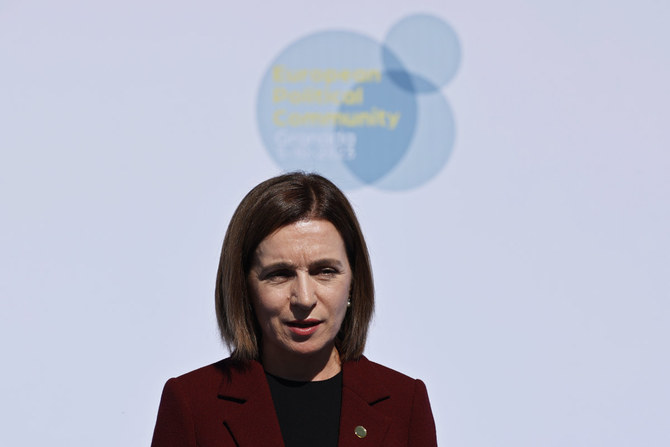Moldova’s pro-European President, Maia Sandu, said Russia’s Wagner paramilitary force was the main force behind an attempt to foment a coup against her, she told the Financial Times in an interview published on Friday.
Sandu, interviewed by the Financial Times during the European Union’s European Political Community summit in Spain, said Wagner’s late leader Yevgeny Prigozhin stood behind the bid to overthrow her.
She also said Moscow remained engaged in attempts to destabilize the country lying between Ukraine and EU member Romania, notably by funnelling money into Moldova to bribe voters in next month’s local elections.
“The information that we have is that it was a plan prepared by (Prigozhin’s) team,” Sandu told the FT in reference to the alleged coup, adding that the group was trying to get anti-government protests, held periodically since last year, to turn violent.
“The situation is really dramatic and we have to protect ourselves.”
Sandu accused Russia in February of plotting a coup against Moldova’s government by exploiting protests.
Russia’s foreign ministry has rejected such claims and previously accused Moldova of pursuing an anti-Russian agenda.
She and other leaders point to longstanding pressure on the country, particularly in terms of pricing and payment for Russian energy supplies. Moscow also exerts influence through a pro-Russian separatist enclave, Transdniestria, in Moldova’s east.
Since Sandu’s 2020 election, Moldova has denounced Russia’s war in Ukraine and become a candidate for EU membership.
Prigozhin, whose mercenaries played a major role in capturing parts of eastern Ukraine for Russia in the past year, staged a brief mutiny against Kremlin leader Vladimir Putin in June. He was killed in plane crash two months later.
“Russia is going to increase its pressure on Moldova,” Sandu told the FT. “They tried energy and they failed. They tried to overthrow the government and they failed. And now they are trying massive interference in our elections, using a lot of money.”
Moldova’s parliament this week took steps to keep allies of fugitive businessman Ilan Shor from contesting the election. Shor was sentenced in absentia in April to 15 years in prison for fraud and his party was banned by the Constitutional Court.
Sandu’s PAS party has a majority in parliament but faces competition in towns and cities against her pro-European policies throughout the country of 2.5 million.
Sandu said Moldova’s intelligence services had detected at least 20 million euros ($21.2 million) in Russian finance coming into the country and suggested the true figure was higher.
Moldovans, she said, were entering the country with “bank cards that were issued in Dubai...they just distribute thousands of cards ...bank cards to people they wanted to bribe.”
Moldovan police on Friday said they had seized thousands of bank cards issued in Dubai due to be given to Shor’s allies.
“This is using bank cards instead of suitcases or black bags full of cash,” Veronica Dragalin, head of Moldova’s Anti-corruption prosecutors, told reporters. “We are talking here about money laundering, a much more serious crime.”


























